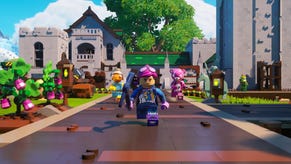Preview: DICE Summit 2010
AIAS president Joseph Olin on this year's Vegas line-up
I think the biggest challenge has been the change, and how change has come - five years ago there was no Facebook, no YouTube, social networking wasn't a phrase that we now accept as core to our everyday jargon.
Games then were dedicated, standalone pieces of entertainment in the way that film and written entertainment had been - but now all that's out of the window.
Most of the change and material things we've talked about as leaders has always been about technology. In reality, the changes that are happening in the marketplace aren't borne out of technology - they're borne out of the social nature of games and entertainment, and the fact that most successful entertainment experiences in our recent history of the last couple of thousand years have always been shared, not solo, experiences.
It's interesting that games have gone from being very social - think arcades, when Street Fighter was in a restaurant lobby before you were seated at your table. There'd be 15 people gathered around that laughing and challenging each other, and that's what sort of happens today when you're in the lobby of Xbox Live. We just take that for granted now.
You have the ability to be interactively entertained on anything that has at least 128x84 pixels - it's come down to a pretty well-defined, finite space, and you sort of expect that somebody's going to offer you the chance to be entertained.
So that means wherever you are or whatever you're doing, you're nature of entertainment satisfaction goes up or down. When I'm sitting in a bus queue it might be Flight Control or Tap Tap Revenge on my iPhone; if I'm sitting on a plane I might be doing something on my Netbook; if I'm on my desk I probably have a window open and I'm trying to grind through another couple of levels on Mafia Wars; and then luxury of luxuries, if I can get a couple of hours in the evening, I'm going to try and get to the train on Uncharted 2.
All of those different opportunities are intriguing to game makers and the creative community, and the challenge has really been more on the distribution and business models, in terms of how you extract a fair level of compensation from an audience in exchange for the entertainment opportunity.
I don't think anybody has the hard-and-fast answer on these things: As much as we celebrate Zynga's success through Facebook, from their own records they spend a fair amount of money trying to maintain their transaction accounts.
As much as Xbox Live is the largest connected console experience, and Modern Warfare 2 is probably at the top of that list right now, the ability to monetise that in other ways is yet to have been discovered.
I think that looking at some of the other game-makers on the DICE roster this year, we've got some guys from Vigil from outside the medium - bringing comic-book characters to life, and how do you do that and get paid? It's always a challenge.
As much as we want to celebrate the art of games, and we think of games as becoming more and more an artistic medium, for most people first and foremost it's commercial entertainment - they got into it to get paid. I don't think there's anything wrong with that, in fact I think we should celebrate it.
If people have great talent, they should get paid for it, and the artistic label is secondary. Some things are, some things aren't, some things probably never will be, and that's alright. But at the same time the challenge is to try - given the diversity within the creative community today relative to when I came to the Academy five years ago... if you go back and look at the DICE programme from 2005 until now, I think you'll see that we try to reflect the diversity within the game-making and business communities, and those are both driven by how consumers see our expressions.
I think it's important to give our talented people the opportunity to talk about what they do and why they're different.
Joseph Olin is president of the Academy of Interactive Arts & Sciences. Interview by Phil Elliott.






.jpeg?width=291&height=164&fit=crop&quality=80&format=jpg&auto=webp)

